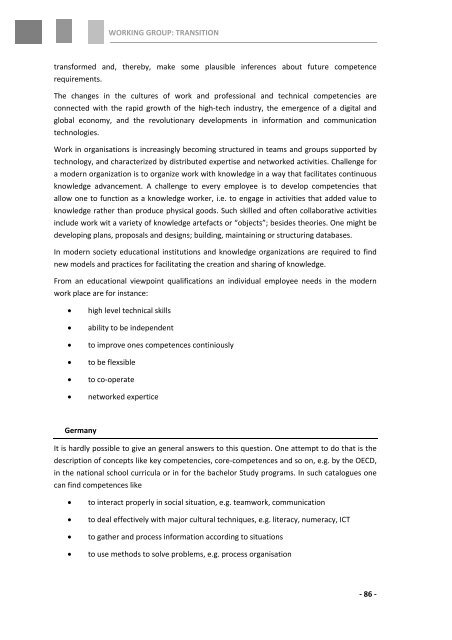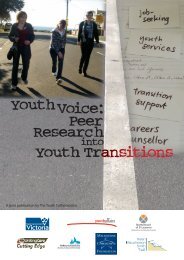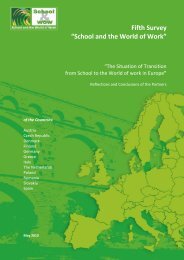Second Survey School and WOW.pdf
Second Survey School and WOW.pdf
Second Survey School and WOW.pdf
Create successful ePaper yourself
Turn your PDF publications into a flip-book with our unique Google optimized e-Paper software.
WORKING GROUP: TRANSITION<br />
transformed <strong>and</strong>, thereby, make some plausible inferences about future competence<br />
requirements.<br />
The changes in the cultures of work <strong>and</strong> professional <strong>and</strong> technical competencies are<br />
connected with the rapid growth of the high‐tech industry, the emergence of a digital <strong>and</strong><br />
global economy, <strong>and</strong> the revolutionary developments in information <strong>and</strong> communication<br />
technologies.<br />
Work in organisations is increasingly becoming structured in teams <strong>and</strong> groups supported by<br />
technology, <strong>and</strong> characterized by distributed expertise <strong>and</strong> networked activities. Challenge for<br />
a modern organization is to organize work with knowledge in a way that facilitates continuous<br />
knowledge advancement. A challenge to every employee is to develop competencies that<br />
allow one to function as a knowledge worker, i.e. to engage in activities that added value to<br />
knowledge rather than produce physical goods. Such skilled <strong>and</strong> often collaborative activities<br />
include work wit a variety of knowledge artefacts or “objects”; besides theories. One might be<br />
developing plans, proposals <strong>and</strong> designs; building, maintaining or structuring databases.<br />
In modern society educational institutions <strong>and</strong> knowledge organizations are required to find<br />
new models <strong>and</strong> practices for facilitating the creation <strong>and</strong> sharing of knowledge.<br />
From an educational viewpoint qualifications an individual employee needs in the modern<br />
work place are for instance:<br />
<br />
<br />
<br />
<br />
<br />
<br />
high level technical skills<br />
ability to be independent<br />
to improve ones competences continiously<br />
to be flexsible<br />
to co‐operate<br />
networked expertice<br />
Germany<br />
It is hardly possible to give an general answers to this question. One attempt to do that is the<br />
description of concepts like key competencies, core‐competences <strong>and</strong> so on, e.g. by the OECD,<br />
in the national school curricula or in for the bachelor Study programs. In such catalogues one<br />
can find competences like<br />
<br />
<br />
<br />
<br />
to interact properly in social situation, e.g. teamwork, communication<br />
to deal effectively with major cultural techniques, e.g. literacy, numeracy, ICT<br />
to gather <strong>and</strong> process information according to situations<br />
to use methods to solve problems, e.g. process organisation<br />
‐ 86 ‐




